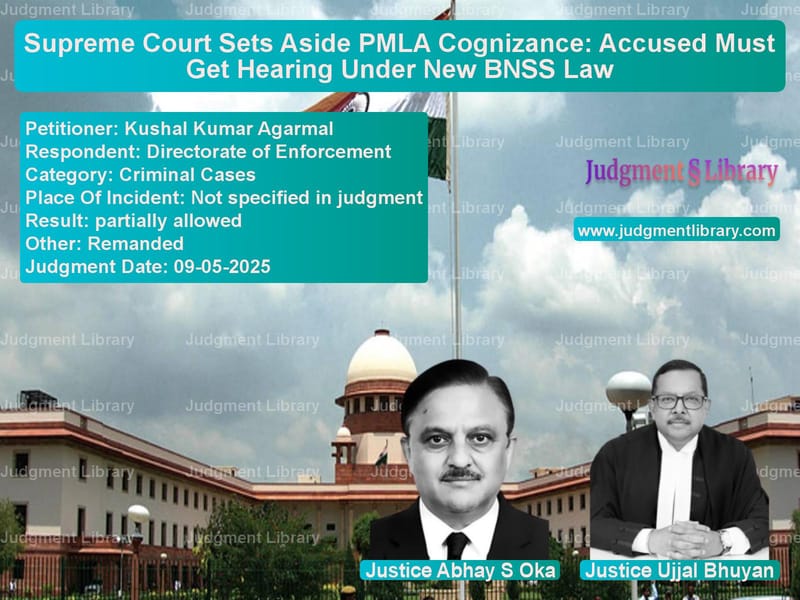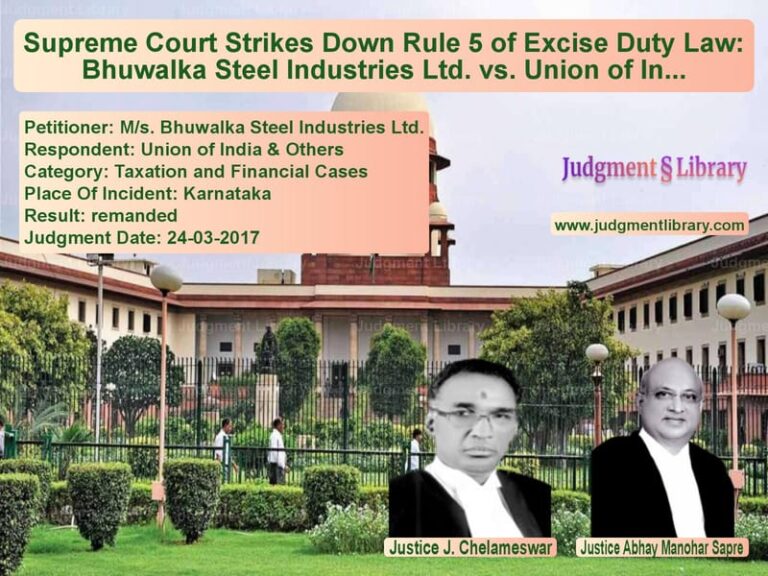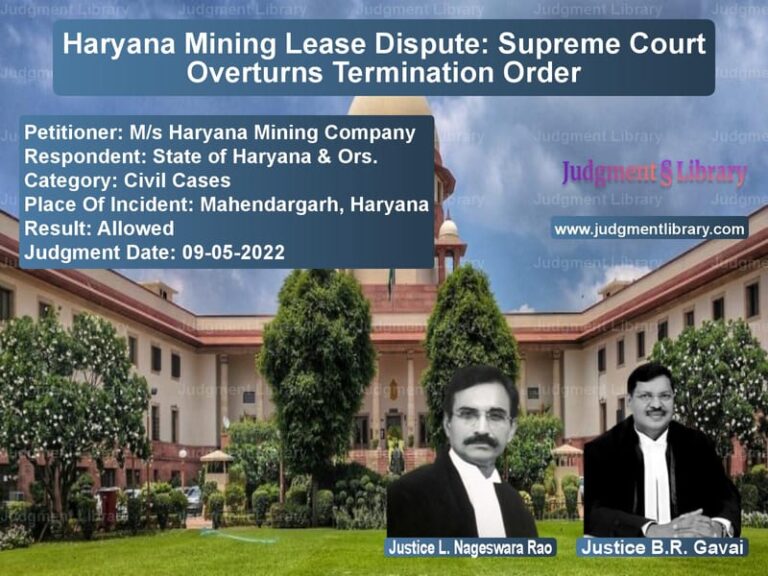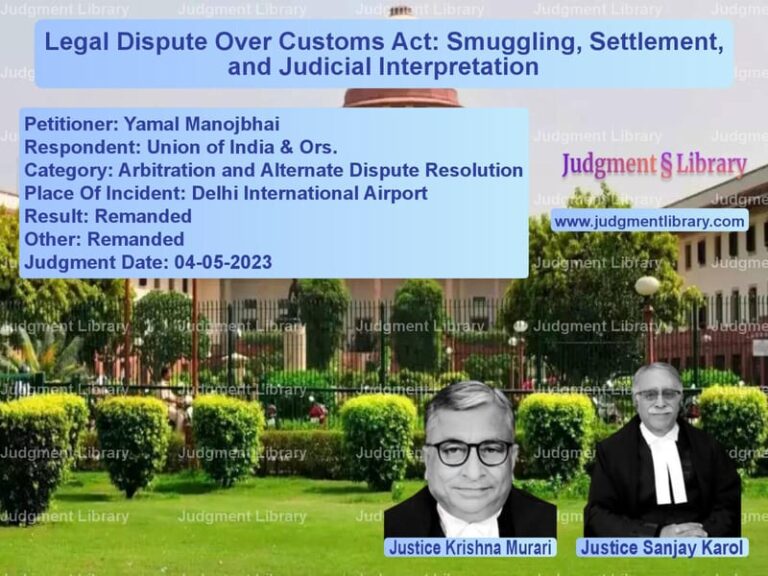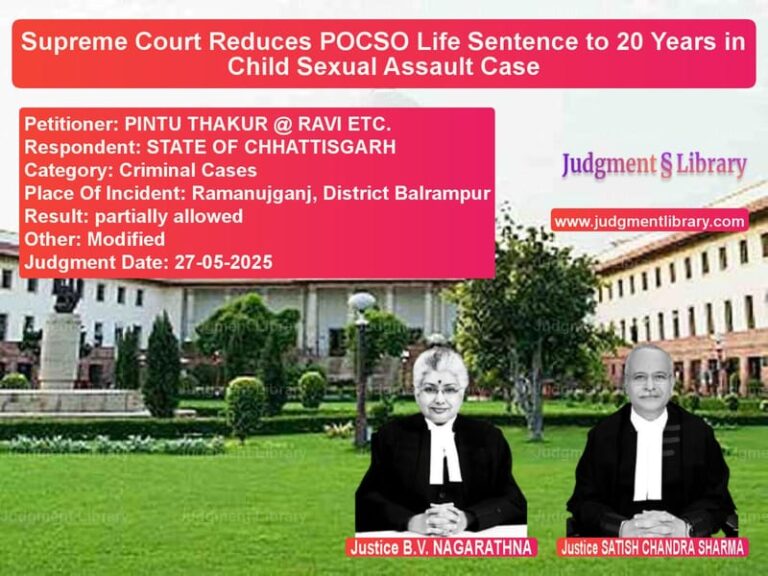Supreme Court Sets Aside PMLA Cognizance: Accused Must Get Hearing Under New BNSS Law
In a significant ruling that clarifies the procedural requirements under the newly enacted Bharatiya Nagarik Suraksha Sanhita (BNSS), the Supreme Court has set aside a Special Court’s order taking cognizance in a money laundering case. The judgment, delivered on May 9, 2025, emphasizes that accused persons must be given an opportunity of being heard before a court takes cognizance of offences under the Prevention of Money Laundering Act (PMLA), marking an important procedural safeguard in criminal jurisprudence.
The case involved Kushal Kumar Agarmal as the appellant against the Directorate of Enforcement. The legal dispute centered around a complaint filed under Section 44(1)(b) of the PMLA on August 2, 2024, where the appellant was named as an accused. What made this case particularly significant was the timing – the complaint was filed after the BNSS came into force on July 1, 2024, replacing the Code of Criminal Procedure (CrPC) for new cases.
The core legal issue revolved around Section 223 of the BNSS, which deals with the examination of complainants. This section contains a crucial proviso that wasn’t present in the corresponding Section 200 of the old CrPC. The Court noted that “Section 223 of the BNSS corresponds to Section 200 of the Code of Criminal Procedure, 1973. However, a proviso similar to the proviso to sub-section (1) of Section 223 does not find place in Section 200 of the CrPC.” This new proviso states clearly that “no cognizance of an offence shall be taken by the Magistrate without giving the accused an opportunity of being heard.”
The appellant’s case was straightforward – the Special Court had taken cognizance of the offence without providing him the mandatory hearing required under the new law. The Court observed that “In this case, admittedly, an opportunity of being heard was not given by the learned Special Judge to the appellant before taking cognizance of the offence on the complaint. Only on that ground, the impugned order dated 20th April, 2024, will have to be set aside.”
The Enforcement Directorate, represented by the learned Additional Solicitor General Mr. Raju, made two significant submissions before the Court. Firstly, he argued that “hearing given to the accused in terms of the proviso to sub-section (1) of Section 223 of the BNSS will be confined to the question whether a case is made out to proceed on the basis of the complaint and hence, only the complaint and the documents produced along with the complaint can be considered at the time of hearing.” This interpretation would have limited the scope of the accused’s hearing to merely examining whether the complaint prima facie discloses an offence.
Secondly, Mr. Raju contended that “it is well settled that cognizance is taken by the criminal Court of the offence and not the offender. Therefore, after taking cognizance and after following the procedure prescribed by proviso to sub-section (1) of Section 223 of the BNSS if cognizance is taken, there will be no occasion to again take cognizance of the same offence when supplementary or further complaints are filed. Therefore, at that stage, there will be no occasion to give the accused the opportunity to be heard.” This argument sought to clarify that the hearing requirement applies only at the initial cognizance stage and not for subsequent proceedings.
However, the Supreme Court, comprising Justices Abhay S Oka and Ujjal Bhuyan, found that these contentious issues didn’t need resolution in the present appeal. The Court stated that “The aforesaid two submissions made by Mr. Raju, the learned Additional Solicitor General, need not be considered, as the same do not arise in this appeal at this stage. However, we make it clear that the said contentions are expressly kept open, which can be raised before the Special Court.” This approach allowed the Court to decide the immediate issue while preserving the larger legal questions for appropriate cases in the future.
The Court’s decision was firmly grounded in the clear language of the new statute. It emphasized that “The proviso to sub-section (1) of Section 223 puts an embargo on the power of the Court to take cognizance by providing that no cognizance of an offence shall be taken by the Magistrate without giving the accused an opportunity of being heard.” This mandatory requirement represents a significant shift from the previous legal regime under the CrPC.
In reaching its conclusion, the Court relied on established precedent regarding the application of procedural laws to PMLA cases. It noted that “This Court has taken a consistent view that a complaint filed by the Enforcement Directorate under Section 44 (1)(b) of the PMLA will be governed by Sections 200 to 204 of the CrPC. This view has been taken by this Court in the cases of Yash Tuteja v/s Union of India and others and Tarsem Lal v/s Enforcement Directorate. Therefore, the provisions of Chapter XVI, containing Sections 223 to 226, will also apply to a complaint under Section 44 of the PMLA.”
The Court was careful to clarify that its ruling was purely on procedural grounds and didn’t touch upon the merits of the case against the appellant. It explicitly stated that “We make it clear that we have not expressed any opinion on the merits of the complaint and the aforesaid contentions raised by the learned Additional Solicitor General.” This ensures that the Enforcement Directorate can pursue the case afresh after complying with the procedural requirements.
To implement its decision, the Court gave specific directions: “We direct the appellant to appear before the Special Court on 14th July, 2025, so that he can be given an opportunity of being heard in terms of the proviso to sub-section (1) of Section 223 of the BNSS. We make it clear that no further notice shall be issued by the Special Court to the appellant.” This puts the responsibility on the accused to appear before the court for the mandatory hearing.
The judgment represents an important interpretation of the newly enacted BNSS, particularly in its application to specialized legislation like the PMLA. The introduction of the requirement for an accused to be heard before cognizance is taken marks a significant procedural reform in Indian criminal jurisprudence. It provides an additional layer of protection for accused persons, allowing them to present their perspective before the court embarks on the formal trial process.
This ruling is particularly significant given the extensive powers granted to enforcement agencies under the PMLA and the serious consequences that follow from money laundering charges. By insisting on strict compliance with the new procedural safeguards, the Supreme Court has reinforced the principle that even in cases involving serious economic offences, due process and fair procedure must be scrupulously followed.
The Court’s approach of deciding only the immediate procedural issue while keeping larger questions open demonstrates judicial restraint and wisdom. It allows the new legal provision to be implemented while giving lower courts the opportunity to develop jurisprudence on its interpretation and application. The reserved questions about the scope of the hearing and its application to supplementary complaints will likely be addressed in future cases as the new BNSS provisions are tested in various factual scenarios.
This judgment serves as an important reminder to all courts dealing with cases under the new BNSS regime to carefully examine and comply with the modified procedural requirements. The shift from the CrPC to BNSS isn’t merely cosmetic but introduces substantive changes in criminal procedure that courts must diligently follow. For accused persons, this ruling reinforces that procedural safeguards are not mere technicalities but essential components of a fair justice delivery system.
As India transitions from the colonial-era CrPC to the new BNSS, judgments like this will play a crucial role in shaping the interpretation and implementation of the new procedural code. The Supreme Court’s emphasis on strict compliance with statutory procedures, even in cases involving powerful enforcement agencies, reaffirms the judiciary’s commitment to upholding the rule of law and ensuring that justice is not only done but seen to be done through proper legal processes.
Petitioner Name: Kushal Kumar Agarmal.Respondent Name: Directorate of Enforcement.Judgment By: Justice Abhay S Oka, Justice Ujjal Bhuyan.Place Of Incident: Not specified in judgment.Judgment Date: 09-05-2025.Result: partially allowed.
Don’t miss out on the full details! Download the complete judgment in PDF format below and gain valuable insights instantly!
Download Judgment: kushal-kumar-agarmal-vs-directorate-of-enfor-supreme-court-of-india-judgment-dated-09-05-2025.pdf
Directly Download Judgment: Directly download this Judgment
See all petitions in Money Laundering Cases
See all petitions in Legal Malpractice
See all petitions in Fraud and Forgery
See all petitions in Other Cases
See all petitions in Judgment by Abhay S. Oka
See all petitions in Judgment by Ujjal Bhuyan
See all petitions in partially allowed
See all petitions in Remanded
See all petitions in supreme court of India judgments May 2025
See all petitions in 2025 judgments
See all posts in Criminal Cases Category
See all allowed petitions in Criminal Cases Category
See all Dismissed petitions in Criminal Cases Category
See all partially allowed petitions in Criminal Cases Category

